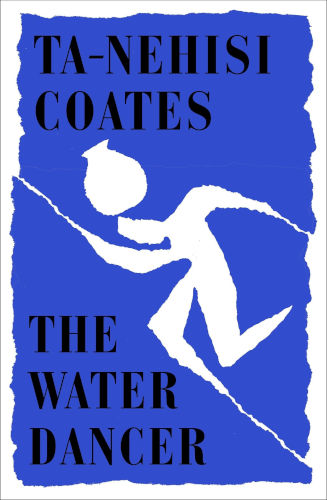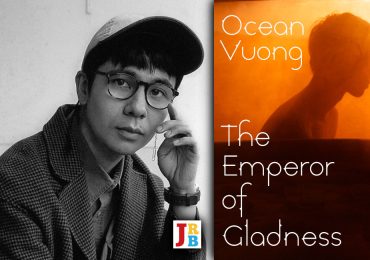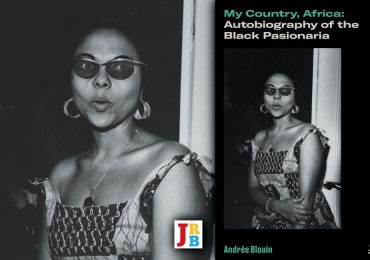Between Baldwin, the world and the Old South—Wamuwi Mbao reviews The Water Dancer by Ta-Nehisi Coates.

The Water Dancer
Ta-Nehisi Coates
Hamish Hamilton, 2019
When people draw comparisons between Ta-Nehisi Coates and James Baldwin, what they are trying to capture is a certain dimension of truth-telling. Think of Baldwin, as you might have come to know him in the recently refurbished I Am Not Your Negro, courtesy director Raoul Peck. Baldwin takes up space. He holds forth. He performs truth-telling. He stares unblinkingly out and he calls on you to remember what you would rather forget. Coates, whose debut novel The Water Dancer is the subject of this review, has marked himself out in recent years as an intellectual voice in public thought on race and its effects on American life. The welter of publicity around Coates’s Between the World and Me, which brought the author wider renown, was a watershed moment. The work was fresh and vital and sobering. It was an epistolary that looked beyond its addressee—Coates’s young son—and exposed the violence behind America’s instantiating mythologies.
When Toni Morrison first likened the two authors, she provided a framework for making sense of what Coates’s writing was doing in the world. Like Baldwin, Coates is an experimenter with form, moving easily from Between’s long-form, to epistolary essay, to the world of the comic book (he writes the Black Panther series of graphic novels). Both Coates and Baldwin are concerned with exposing what lies behind the great American fantasy. Coates writes very differently from Baldwin—where Baldwin’s sentences are tightly strung and controlled detonations of meaning, Coates writes in a looser, more pliant rhythm—but they have a similar shtick: the deadpan tone which impels the reader towards an inexorable confrontation with white America’s hypocrisy. Both writers bring an immense eloquence to bear on the bestial treatment of Black Americans by white Americans. Coates’ writing is undoubtedly indebted to Baldwin, beyond the obvious conceit of Between the World and Me (which leans for its form on Baldwin’s The Fire This Time), and both present a mode of Black public intellectuality that is shot through with the complications of speaking about collective trauma.
The question of whether Coates is yet the artistic equal of Baldwin is a false one. It’s easy to forget that much of the adulation and deep esteem that surrounds Baldwin accrued after his death; and it says something that Morrison felt we ought to appreciate Coates now, while he is still working. In any event, the publicity that accompanied Between the World and Me made it easy to overlook that Coates was not a new or ‘emergent’ voice in America’s public conversation. For a decade before Between, Coates had been writing incisively about race in The Atlantic. His now-famous article The Case for Reparations is a 15,000 word exploded view of the ways American institutions have structurally benefited from the systemic plunder of African Americans. It is not chance that accounts for Coates’s rise to prominence at a time when America’s administrative ship of fools is doing its best to erase any of the difficult gains achieved under Barack Obama’s administration. Coates’ preoccupation with how Black America has been kneecapped by a pervasive and ethically moribund system of racialised violence is deeply necessary. If he sounds like Baldwin at times, then it is because—like his writing progenitor—he unflinchingly sinks his hands into the historical bog. He brings up the bodies through his writing.
The Water Dancer is a depth charge aimed at the submerged wreckage of Southern slavery. Coates employs the emotive metaphor of the water journey to shape a narrative about remembering and healing. At the start of this four-hundred-page historical drama, we meet our protagonist, Hiram, as he is plunged into a new and alienating knowledge of his circumstances. Hiram is one of the Tasked—Coates rarely refers to ‘slavery’—on a Virginia tobacco plantation. His father is the white patriarch of the balefully named Lockless estate, and his mother is a rebellious slave sold at auction, whose disappearance creates an unreconcilable traumatic memory in her young son. The novel is set in the declining days of the Virginia franchises. The land has been worked to exhaustion, the boom days of tobacco wealth are fading, and while the white families—Coates terms them ‘the Quality’—are still parading and maintaining the façade of high society, the entire enterprise is taking on water.
Hiram is uncommonly intelligent, and his notable gift is an inexhaustible memory. When he is brought up to the main house from the nameless wretchedness of the Street, he begins to believe that he is destined for a better life than what he has observed around him:
I tried to remember the Street and Thena’s admonition, They ain’t your family. But seeing the estate as I now did—rolling green hills in summer, woods blossoming in red and gold in fall, and then in winter a snow dappling everything, and seeing, though living below, the main house of Lockless, the great columns of the portico, the setting sun casting itself through the fanlight, seeing the winding corridors, and seeing the grand portraits of my grandfather and grandmother, my eyes in theirs, I began, in my quiet moments, to imagine myself in their ranks.
He is encouraged in his fatal delusion by the Walker patriarch, who tacitly encourages the young Hiram. Hiram’s half-brother Maynard is the heir apparent, and a malevolently caddish buffoon who has alienated himself from the ranks of the Quality because he does not know how to play the role of the white gentleman. Hiram observes his brother’s path towards the ancestral seat, ruefully noting:
I was certain my father saw things as I did, and I wondered how wrong it must have felt to see the best of you emerge in this way, in the place you didn’t expect, indeed in the place your whole world depends on it never appearing.
Coates is acutely aware that white supremacy requires a wilful investment in an unsustainable fantasy whose boundaries are only maintained through violence. Hiram gradually learns that the society he has longed to be a part of depends on the Tasked for its existence:
The masters could not bring water to boil, harness a horse, nor strap their own drawers without us. We were better than them—we had to be. Sloth was literal death for us, while for them it was the whole ambition of their lives.
This realisation makes his bondage more and more unfathomable. What accident of fate has installed people so ill-equipped at the top of the order?
If I had to choose one point in the narrative that illustrates the story’s returning fixation, it is early on in the first section, where Hiram is moving through town while waiting for Maynard. It’s late afternoon, and he watches warily as the merriment of the Quality reveals its malignant inner workings:
This was their civilization—a mask so thin that for the first time in my life, I wondered what I myself had ever aspired to in those days back down in the Street, with my trick of memory, designing to catch the eye of the Pharaoh of Lockless, and not for the first time I saw that I had set my sights much too low. Because we in the Warrens lived among them, we knew first-hand that they took the privy as all others, that they were young and stupid, and old and frail, and that their powers were all a fiction. They were no better than us, and in so many ways worse.
Hiram’s fatal flaw is to regard himself as independent, and the curdling realisation that follows is that he is as much part of Lockless’s property as the shining house on the hill. He is caught between the false consciousness of the Quality and the burning awareness that being Tasked means occupying a world where being exceptional counts for nothing. The galvanising event of the book comes early on, when Hiram is suddenly possessed by something paranormal while driving his brother home one afternoon. They plunge into a swirling river (deadly rivers seem to be the only rivers one finds down south), and only Hiram survives. His experience awakens him to the presence of a realm that lies beyond speaking. Only those who have the power Hiram possesses, the power of ‘Conduction’, can access this realm. This ability is rather hazily defined in the novel, but seems to cohere around the power to vanish in one place and appear in another, a helpful superpower that attracts the attentions of the mysterious Underground Railroad. Coates reprises the devastating tale of the enslaved who flung themselves into the Atlantic rather than be carried into the unknown.
The peril of recreating the Old South as Coates does in this novel is the problem of getting behind the drapes. The sociological conceit behind this novel is that the fine society of antebellum America is a rotten brocade woven from wilful self-deception. The disorder of the South has been a preoccupation of everyone from Morrison and Didion to Faulkner and Tarantino. As such, there is a thicket of counter-representation that has to be cut back, and not all of it is thinned successfully. There were moments in the novel where I felt as though Coates was becoming entangled in the undergrowth. Hiram’s inner monologue is often magniloquent, producing the gradually annoying effect of watching someone rather hammily play a stage role. (Film gets around this representational quagmire by having the characters default to modern-day speech, but this would collapse the carefully-crafted fiction.) Coates is very good at making detail speak, but he is less successful in creating a character who can transmit those details to us. The Water Dancer does not depend on the stock-cube of Southern Detail for its rendering: Coates avoids retreading the horrors of rape, whipping and ritualised humiliation. Rather, we are spoken to by a steady epistolary voice throughout, as the novel unspools in one lengthy remembrance. Hiram has been given much acreage on which to plant his story, but unfortunately he is a rather wooden character, and so he often disappears beneath the story. One feels that Coates should perhaps have tried harder to bring his character’s quiddity across. As it is, we hear how clever and insightful Hiram is, but we rarely see evidence of it beyond the saying.
This failure suggests a muddying of concept: Coates is trying to evoke the form of the traditional slave narrative through Hiram’s voice, but surely (given what we know of how such narratives were themselves literary constructions) Hiram might have been made more human? It doesn’t help that long stretches of the novel feel like they’re trying to replicate the slow pace of those slave narratives, to nobody’s great benefit. When yet another character is invoked to announce (and denounce) the evils of slavery, you begin to drum your fingers and wonder when the action is going to resume. It’s all the more frustrating because in other places, Coates’s writing soars beautifully. When he aims his finely-tuned prose at describing the wrenching separations of families and lovers, the work has a tenderness that grabs at the reader and won’t let go.
However, because the novel builds itself around the idea that Hiram will become the hero, you expect that everything will synthesise into one cohesive narrative. But reaching the end of The Water Dancer is like being dropped off a street or two away from where you expect to be. It’s an extraordinarily frustrating anticlimax, but one that suggests that remaking the country can only be accomplished by remaking the memories that are embedded in the soil. This modernises the story by not simply substituting one fantasy of violence for another, but by remaking the terrain upon which new ways of thinking about the past can take place.
That the novel ends with no easy resolution, no displacing of trauma through revenge (in this regard, the story makes you think what a faux pas Nate Parker’s 2016 film The Birth of a Nation was) is curious, but it is also profoundly unsatisfying, because the pacing of the novel, despite its surplus of contemplative moments, leads you to expect some sort of flourish. In the end, it becomes a bit too top-heavy to be sustained, and so we end up with an excess of quotables and an under-supply of pacing. The nagging sense I was left with is that Coates is better as a medium-distance athlete, and that he perhaps underestimated the skill required to keep such a massive story going over the distance a novel demands.
In many senses, The Water Dancer is of a piece with the sort of counter-mythological work that has made itself felt in Black America over the past decade. At a time when filmmakers are envisioning Harriet Tubman (who has a prominent walk-on role in The Water Dancer) as an action hero, this novel seems to be more about speaking to the present than about reinvigorating the buried past. This is, finally, perhaps where the major flaw in the novel lies: because it is actually about the value of remembering, its plot seems too loosely suspended from the point Coates is trying to make. To say this is not to damn the novel outright. The story of American slavery is too big for the telling, and few writers will be able to touch the heights Toni Morrison achieved with Beloved. For all its failings, The Water Dancer is a deeply-researched work that is eminently readable, but not quite in the way it promises to be. It is a page-turner that is impatient to be realised on the big screen, and that impatience trips up the story. It could have been a better novel. But like his great intellectual forebear, Coates doesn’t always get it right, and that’s okay.
- Wamuwi Mbao is an essayist, cultural critic and academic at Stellenbosch University. Follow him on Twitter.





